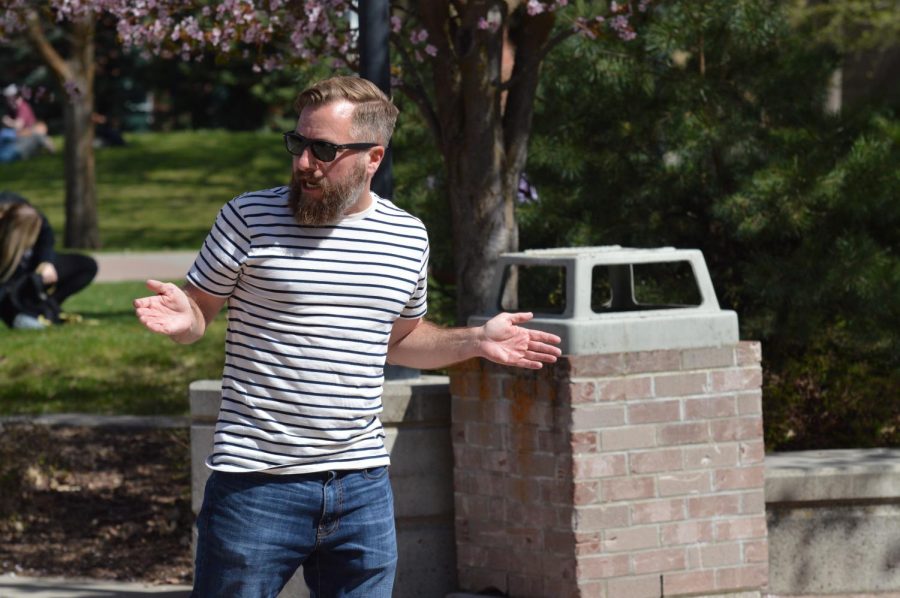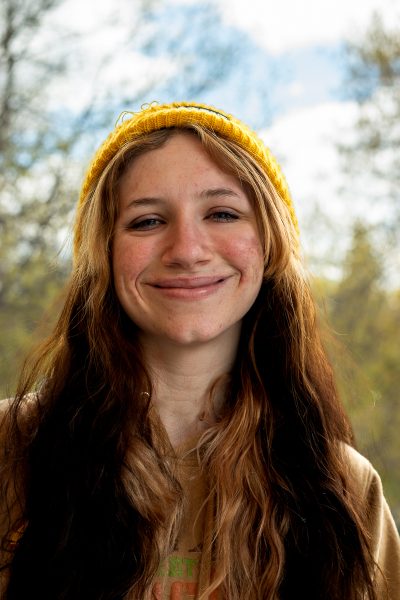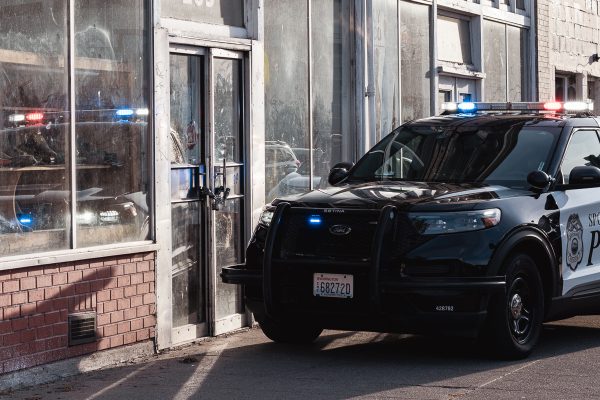Warmer weather brings hotter tempers to EWU
Preacher Keith Darrel talks to a crowd of students outside of the JFK Library. Darrell’s unconventional style of preaching Christianity draws him plenty of attention when he preaches at college campuses around the region | Bailey Monteith for The Easterner
May 3, 2018
Around this time of year when the weather starts to warm up, EWU has more events outside. One infamous character is a preacher known for his strong stances and shouting at students.
“I don’t know what he is trying to do other than yell at college students,” Mydranda Schee, a junior from the Pride Center said. “He is using the wrong platform for what he is trying to do.”
The preacher’s name is Keith Darrell, who started The Whitefield Fellowship that is based in Bellbrook, Ohio. In an introduction video on his website, Darrell explains why he goes to college campuses while the Johnny Cash song, “God’s Gonna Cut You Down,” plays in the background.
He points to the days in Rome when preaching in a public forum was the most popular way to attract people to hear the word of God. Darrell said he was inspired to study the Bible and preach after a preacher came to his campus while he was in college.
He then goes on to say where the Whitefield Fellowship name came from.
“George Whitefield was an evangelical preacher in the 18th century who preached to the American colonies and England,” said Darrell. “Whitefield’s preachings was so used by God to bring about extraordinary change in the hearts and minds that this period was known as ‘The Great Awakening.’”
Other than being a popular preacher, Whitefield was commonly known for his pro-slavery beliefs, and fought in 1748 and 1750 for slavery to be legalized. In 1751, when it did become legalized, he viewed this as “a personal victory and part divine will,” according to the book “Inventing George Whitefield: Race, Revivalism, and the Making of a Religious Icon.”
Darrell goes to all the local campuses in the area, from WSU to Montana State and the University of Idaho. He has multiple pictures on his website showing him preaching at campuses, most apparent EWU.
In a YouTube video on his channel, Darrell talks fondly about the four times he has been punched at colleges while preaching, his first from the University of Idaho after he got into an argument with a woman.
“After a few minutes […] she runs out of things to say and goes ‘you’re an ignorant pedophile,’ and I said ‘I think you are dealing with your own issues out here,’ and at that point she punched me,” said Darrell. “[After punching me] She walks through the crowd and I thought it would be funny to say ‘Even though you’re a feminist, you still hit like a girl.’”
While Darrell was on campus April 24, he drew a mix of reactions from students. Some walking by filmed him on their phones, while some sat down to debate with him outside the JFK Library. Others seemed to be agreeing with his message.
“He says a lot of hateful things, he yells at people,” Alexander Brooks, a senior from the Pride Center said. “He can be very aggressive and he really wants attention from everyone else.”
While Darrell’s goal is to teach Christianity to students, his words and style often does not appear to do that. Telling students “What you really love is darkness, not lightness,” and saying “When God sends you to hell…”
“If you are a Christian person and you want to spread the word of Jesus, of Christianity, that’s fantastic,” said Schee. “But that’s not the way to do it. To get in people’s faces and do that.”
Yet, even though some don’t agree with the message he puts forward, they believed in his right to come and preach.
“While I disagree with him, it’s free speech,” said Schee. “He has the right to be there as much as we have a right to be there. The only way to fight free speech is with more free speech.”






![Simmons said the biggest reasons for her success this year were “God, hard work, and trusting [her] coach and what she has planned.”](https://theeasterner.org/wp-content/uploads/2024/05/image1-1-1200x800.jpg)


![Simmons said the biggest reasons for her success this year were “God, hard work, and trusting [her] coach and what she has planned.”](https://theeasterner.org/wp-content/uploads/2024/05/image1-1-600x400.jpg)






